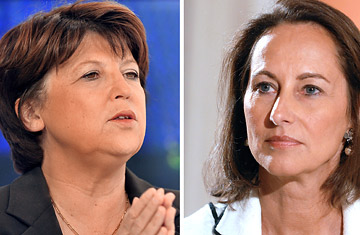
Socialist Mayor of the northern French city of Lille Martine Aubry, Left, and former presidential candidate Segolene Royal.
Everything else may be up in the air, but one thing is certain already: when the tally from Friday evening's voting is in, France's Socialist Party (PS) will be headed by a woman for the first time in its history. Once installed in that leadership role, however, that new patronne must find a way to repair the deep and bitter divisions that have plagued the party for more than a decade — and reverse its impotence in time to challenge conservative President Nicolas Sarkozy in the 2012 race for the Elysée.
Good luck with that. The two women competing in Friday's final are as formidable as they are divisive. Ségolène Royal — who lost to Sarkozy in the 2007 presidential election — is both pragmatic and popular. She has nevertheless been derided by opponents as lacking a credible platform and accused of wanting the top spot to advance another run at the presidency in 2012. Meanwhile, Martine Aubry is the architect of France's now defunct 35-hour workweek; she is known as a tried and tested traditional leftist seeking to take the party back to its roots. However, she generates resistance and even disdain within both the party and the public, who see her as stuck in an ideologically rigid era that has passed. Both women had been written off by party heavyweights as has-beens. Now, however, they find themselves facing off for the job of restoring unity and direction to the Socialist Party.
In the first round of voting on Thursday, Royal finished first with 43%, versus 34% for Aubry and 23% for Benoît Hamon, a candidate from the party's left flank. Hamon then threw his support behind Aubry for tonight's runoff. That suggests an Aubry victory, but the polarizing powers of both women make predicting the outcome difficult. "Because of that — and because the outcome will be close to 50-50 — I believe the eventual winner will have an extremely difficult time unifying and leading what is an extremely riven Socialist Party," says Pascal Perrineau, director of the Center for the Study of French Political Life in Paris. "The negative passions these two women generate sadly prove that hatred is not a vice associated exclusively with men. The [Socialists] will almost certainly pay dearly for that excess of emotion in the months and years to come, while Nicolas Sarkozy will be rejoicing over it."
While the policy objectives of the two candidates are not that different, there are points of major contention. One major clash is strategic: Royal calls for a partnership with centrists to recapture national power, while Aubry rejects that in favor of an opposite lean to hook up with Green, Communist and other leftist parties. The more explosive rub involves style. Aubry is staid and wonky, and she prefers more orthodox-sounding leftist pronouncements. Royal has a high-profile-celebrity quotient and a highly personalized communication style focused on modernity and change, frequently featuring frontal attacks on Sarkozy.
"Competent, determined and conviction-founded, Martine Aubry represents Socialist continuity and an attachment to the classic left; unpredictable, modern, telegenic, Ségolène Royal is the TV Madonna gifted with an iron will and whirring pragmatism," wrote daily Libération editor Laurent Joffrin in his Op-Ed Friday. "Martine Aubry wants to safeguard the homestead, while Ségolène Royal chases adventure," Joffrin continued, noting that in the absence of any major ideological gulf between the two reform-minded women, "there is an incontestable opposition of style."
The rivals' individual histories within the party have their share of drama. The daughter of former European Commission President Jacques Delors, Aubry, 58, was named to successive government posts after establishing herself as a major mover in the PS and among Socialist legislators. In 2000 she became the target of conservative ire when her law reducing France's workweek to 35 hours was adopted. (It was gutted by Sarkozy's government last July.)
Royal, meanwhile, made her main entry into politics as an adviser to the late President François Mitterrand and later held cabinet positions in government where she drew attention by working during her pregnancy — and unapologetically defending family and education positions normally associated with conservatives. Following her presidential defeat, Royal stunned many observers by publicly dumping Socialist Party leader François Hollande — her companion and the father of her four children — and announcing she'd seek his post during the current election. To some, that made Royal the symbol of the strong, modern woman in politics; to others, it cast her as the classic snake in the grass.
"These iconic roles are rekindling the passion for politics that the French lost in the 1990s and early 2000s, when ideology waned," says Perrineau. "Now larger-than-life personalities and clashing styles have fanned those political passions again — Sarkozy being the best example of that, but one now also creating anti-Sarkozy icons. The problem for the party is, it now has two anti-Sarkozy icons battling for the party leadership as anti-icons of each other. And the passions that it is creating will have to be reckoned with for a long time."
